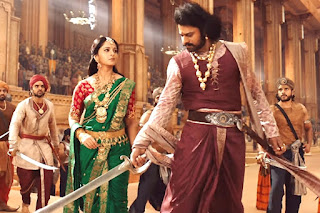Sunday, April 30, 2017
Baahubali 2: The Conclusion
Hollow Spectacle
When the first part of Baahubali was released, the question in the review was, “Rajamouli has made India’s most expensive film so far, and undoubtedly matched the CGI magic of any Hollywood film. But, one couldn’t help thinking that if so much money could have been spent on the visuals, couldn’t a fraction of it have been spent on content? It has the age-old rivalry between princely brothers story that has been done to death in old films. Rajamouli has just taken the SS Vasan kind of costume drama (Chandralekha—1948, being a prime example) and updated the technology. It is set in a fictional universe, with no geographical authenticity of any kind—and that doesn’t really matter; because the audience does see it as a comic book on screen.”
Part 2 outdoes the first in excess--everything is so huge and opulent, that it is sometimes ugly. The look is inspired by Amar Chitra Katha comics, but just like our animation films never move beyond mythology, Rajamouli has also stayed within the confines of an old fairy tale.
Baahubali 2: The Conclusion, is like a prequel and sequel in one; the audience discovers why the infant Mahendra Baahubali was taken away from the kingdom of Maheshmati by his grandmother, and brought up by adoptive parents. Going back into the simple tale, Mahendra’s father, Amarendra (both played by Prabhas) was ousted from the throne by his evil uncle (Nasser) and cousin Bhallaldeva (Rana Daggubatti). The queen, Shivagami (Ramya Krishna--unblinking) is manipulated into agreeing to their plans. Mahendra fell in love with and married the outspoken princess Devasena (Anushka Shetty), who in the first part, was shown incarcerated in Bhallaldeva’s prison.
The romance between Mahendra and Devasena, with him pretending to be a simpleton, is tedious. The comic track involving the loyal slave Katappa (Sathyaraj) and Devasena’s puffed up cousin Kumar Varma (Subba Raju) is not in the least amusing. It is as if Rajamouli was just padding the film with some dramatic scenes in between the extravagant action set pieces, one of which involved a stampede of cattle with their horns on fire.
There is a lot of jumping from heights, leaping over hurdles, shooting of arrows, slashing with swords, and slaughtering thousands of men; the sets are lavish and the CGI painstakingly done, but nothing that is truly enjoyable. The songs (music by MM Keeravani) drones on accompanying bombastic lyrics. Not much acting is required, so everybody performs in an exaggerated style, like they were on stage in an old melodrama.
The audiences that made Baahubali a hit, might just shower crores on the second part too. What the film does is prove that such over-the-top spectacles can be made in India too. Hopefully, some day, Rajamouli or some other filmmaker with this kind of budget, will make a film that will marry visual splendour with an absorbing plot. Till then, gawking at flying ships, trees turned into catapults, rampaging elephants and bursting dams will have to pass off as entertainment.
Labels: Cinemaah
Maatr
Hackneyed Revenge Drama
In the commercial films of 1980-90s, rape was a standard plot device to enable the hero—and sometimes the heroine—to take gory revenge. For some years this formula was buried, but the post Nirbhaya focus on the fight for justice in crimes against women, seems to have brought it right back. However, like Pink, or even NH10, a film should have something to say beyond the obvious.
Ashtar Sayed’s Maatr, is as hackneyed as it possible for a film about rape to be, but it still pushes the right buttons of horror and outrage, because that kind of nightmare is constantly being reported in the media. Vidya (Raveena Tandon) and her daughter Tia (Alisha Khan) are returning late from a school function, and she takes a deserted lane to avoid traffic. Both are violently raped and left for dead by the side of the street. The daughter dies, and Vidya barely survives, but she is blamed by her callous husband (Rushad Rana) for happened to her; and even the cops are indifferent. The perpetrator is Apoorva (Madhur Mittal), the nasty son of the chief minister, who has a bunch of cronies with him.
Vidya has only her loyal friend Ritu (Divya Jagdale) for support, and she realises that she cannot get justice the legal way. Even the corrupt cop, Jayant Shroff (Anurag Arora) is of the opinion that there is no point in fighting a losing battle. It would be easy for them to prove consent, he says.
Vidya then decides to punish the men her own way. She kills them one by one, but there is too much coincidence and contrivance to how she goes about it. The one thing in the film’s favour is that unlike the Zakhmi Aurat kind of films, there is no shouting or ranting. Raveena Tandon and Divya Jagdale ably carry the film and make it slightly watchable. But the takeaway still is, that vigilante justice is right, because the powerful can away with heinous crimes; what makes it worse is that the men are so inhuman in their brutality, it makes you wonder what kind of society breeds such monsters.
Labels: Cinemaah

